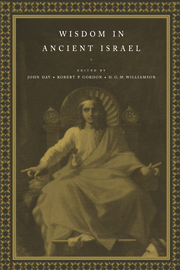Book contents
Introduction
Published online by Cambridge University Press: 16 October 2009
Summary
The rehabilitation of Israelite wisdom has been one of the more significant developments in Old Testament scholarship in the last third of the twentieth century. For too long wisdom had been a casualty of the long-running quest for a theological centre in the Old Testament which had seen a variety of potential unifying themes proposed and wisdom almost invariably marginalized in the accompanying discussion. Since the wisdom texts paid little attention to cult and even less to covenant it was virtually inevitable that, as long as the quest persisted in this form, wisdom would be on the sidelines. But the Old Testament contains wisdom literature as part of its witness to the religion, not to say the faith, of ancient Israel, and its importance cannot simply be assessed in proportion to its compatibility with some overarching statement of what Old Testament theology is about. Wisdom's lot is now, in any case, a happier one with the advent of less reductionistic and more pluriform approaches to the description of Old Testament theology. Whatever its special emphases, wisdom as the foremost expression of Israelite intellectual endeavour is, in its more usual manifestations, predicated on a belief in the orderly governance of the world by God. Its character is thus misstated if it is presented merely as a secular alternative to the religious outlook of the rest of the Hebrew scriptures. Current interest in the subject has been deepened by an increased scholarly appreciation of the importance of wisdom thinking and literature among Israel's neighbours, notably in Egypt and Mesopotamia.
- Type
- Chapter
- Information
- Wisdom in Ancient Israel , pp. 1 - 14Publisher: Cambridge University PressPrint publication year: 1995

